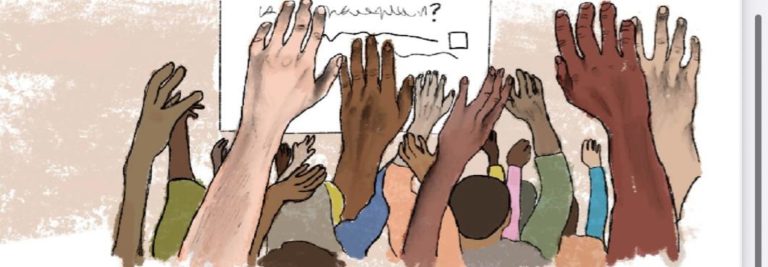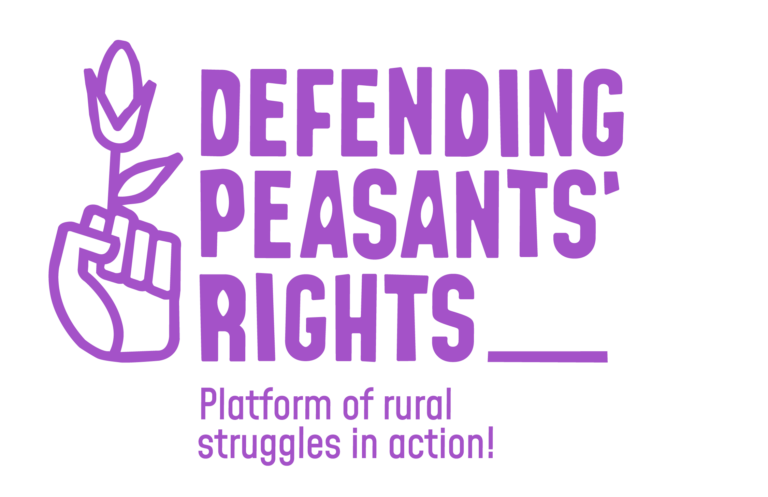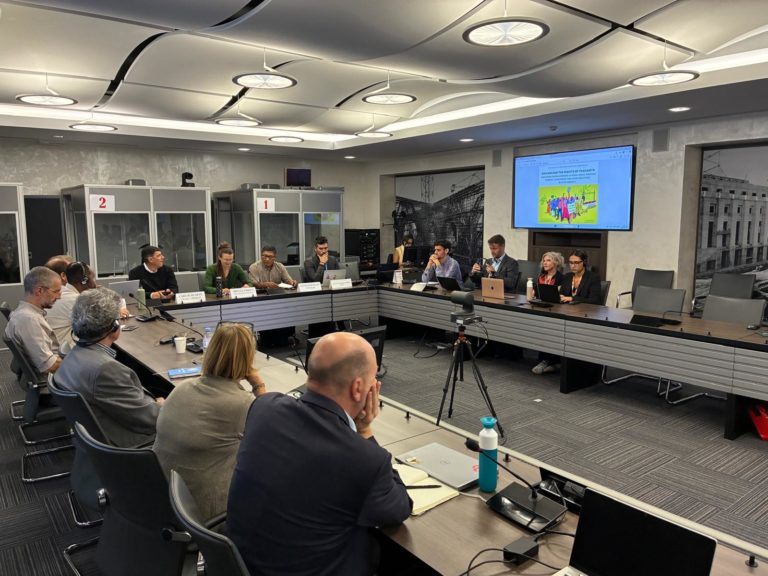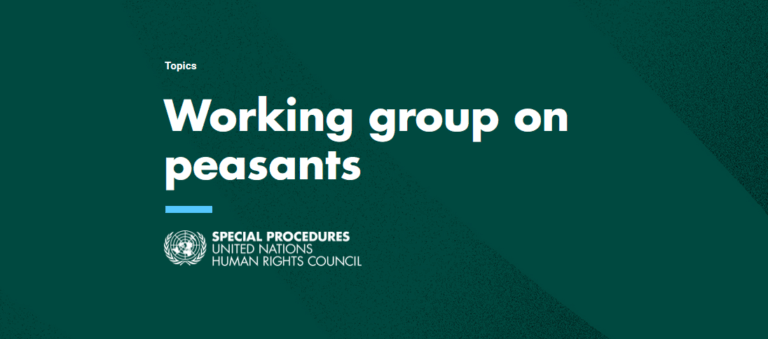Exclusive interview with Carlos Duarte, Chair of the UN Working Group on UNDROP.
Defending Peasants’ Rights conducted an exclusive interview with Carlos Duarte, current Chair of the UN Working Group on the Rights of Peasants and Other People Working in Rural Areas.
The conversation took place during his visit to Geneva, on the occasion of the presentation to the Human Rights Council of the newly released report on the systemic challenges faced by rural communities around the world. Duarte outlined the report’s drafting process — which was marked by significant civil society participation — and highlighted its main findings and recommendations addressed to States.
Throughout the interview, Duarte also emphasized the role of the Working Group he currently chairs, underlining the importance of strengthening collaboration with peasant and rural organizations as a key strategy for advancing the implementation of the United Nations Declaration on the Rights of Peasants and Other People Working in Rural Areas (UNDROP) globally.
Read the full interview:
- Could you please remind us what the UN Working Group on the UNDROP is, what its mandate entails, and what its main objectives are?
Our main objective is to work on the dissemination of the Declaration at the global level, and to provide technical support to States and civil society in understanding the Declaration and in its proper implementation. Likewise, we are very committed to ensuring that the rights of peasants, both men and women, and rural workers are not violated by States or by other private actors. And when such violations do occur, they must be reported through the mechanisms we have available.
The Working Group is composed of five experts at a global level. We have an expert, Geneviève Savigny, who has dedicated all her work to the Declaration process and is a member of La Vía Campesina. She represents Western Europe, North America, Australia and Japan. There are also the representatives of Eastern Europe (Davit Hakobyan), of Asia (Shalmali Guttal), and of Africa (Uche Ewelukwa Ofodile).
As for my own case, I was elected for Latin America and the Caribbean. For my election, I had the support of three large peasant organisations from Colombia, which were the Coordinador Nacional Agrario, the Asociación Nacional de Zonas de Reserva Campesina, and the Asociación Nacional de Usuarios Campesinos. These three organisations supported my candidacy, as did the Ministry of Agriculture of Colombia.
- Under your presidency, the Working Group has just presented a report to the UN Human Rights Council on emerging trends and risks faced by the rights holders of the UNDROP. What was the process behind the preparation of this report?
We have several ways of engaging both with States and with civil society, as well as with our rights holders.
Perhaps the most direct tool we have — and which we try to ensure is reflected clearly in our reports — is the input we receive from civil society and from States. This particular report draws on contributions from 2024 and 2025, aiming to highlight the main challenges faced by peasant and rural communities, while also gathering examples of good practices from around the world. That is our most important resource, but not the only one.
We also receive urgent appeals and communications from civil society. In addition, we carry out technical visits — both to States and to civil society actors — in support of the implementation of the Declaration.
Each of us in the Working Group has been engaging and travelling within our respective regions to support social organisations, and this has also been a valuable source of input for the report. Furthermore, on many occasions, social organisations or networks of NGOs invite us to visit countries and work directly on the ground.
This year, for example, we supported discussions on food in Argentina, seeds in Guatemala, and water and rural women in Ecuador. We’ve also taken part in events such as the Nyéléni Forum, attended by our colleague Shalmali Guttal, and we’ll be participating in the CFS in Rome with Geneviève Savigny. We also took part in COP16 in Cali, where we aimed to stay informed about the views of civil society and the debates taking place.
We also draw on specialised literature and official reports from both States and the United Nations system, in order to produce a report that is based on multiple sources. As far as possible, we try to cross-reference and verify the information we include.
- What were the main findings and challenges identified in the report?
This report seeks to assess the current situation of peasants and rural workers around the world, and more broadly, of all rights holders under the UNDROP Declaration. Around twelve years ago, the Advisory Committee of the UN Human Rights Council conducted an assessment that served as the foundation for drafting the Declaration — after recognising that the situation of the peasantry at the global level was critical. Our goal was to evaluate how the situation has evolved since then.
Unfortunately, we found that the situation of rural populations — the rights holders — remains critical globally. The inequality gap between rural and urban populations has not diminished; in fact, it has widened, especially as a result of the pandemic, as well as serious instability, conflict, and processes linked to climate change. Regrettably, we must point out that rural populations are the ones experiencing the highest levels of hunger in the world, which is an absolute paradox. Those who produce our food are the ones who go hungriest.
We have identified three key themes that cut across our report.
First, there is a major concern regarding the loss of territories, land, and nature-related resources vital to the livelihoods of rural communities. In other words, land and water are being increasingly privatised, to such an extent that we have warned we may be witnessing the onset of a new wave of agrarian counter-reform across the globe. Land ownership and concentration continue to rise, and in this context, we advocate for the recovery of agrarian reform policies as essential tools to address territorial rights imbalances.
We also propose to broaden the concept of rural territorial space beyond just the land, to include other relationships with nature — such as oceans and rivers, which are essential territories for fishing communities and central to their sense of territoriality — as well as areas such as forests. Moreover, it’s crucial to recognise mobile populations such as pastoralist peoples and migrant workers.
We therefore suggest that countries, as well as institutions like the United Nations and FAO, adopt more complex indicators than just land ownership. There needs to be a shift towards a broader territorial understanding in order to grasp the true nature of these challenges.
Secondly, a very evident issue raised in the contributions was the role of rural women. Despite all these years, rural women continue to face significant gaps in political participation and leadership. But it’s not only about participation; it’s also about access to land titles, or to financial mechanisms for rural development projects. This is an area that needs to be addressed transversally to close the gender gap, which remains substantial.
A third key issue we wish to highlight concerns the political persecution and dispossession of peasant communities from their territories. Stigmatisation continues to be closely associated with rural and peasant leadership, reflecting structural challenges that vary across different states and rural contexts — including the presence of armed political actors, both legal and illegal, tribal factions in certain regions, and economies based on illicit activities. States often stigmatise rural populations for dynamics that are, ironically, the responsibility of the State to control. In many cases, rural communities are blamed for phenomena that are clearly beyond their control — and that, more often than not, they suffer as victims. We have seen that across the world, the leadership and environmental defence carried out by UNDROP’s rights holders frequently exposes them to persecution, criminalisation, and, in many cases, even murder or enforced disappearance.
These three issues are transversal themes in our report. There are, of course, other specific findings, but these roughly summarise a situation in which, although there has been some progress, the overall conditions for peasants and rural workers remain extremely urgent and precarious at the global level.
- What measures can be taken to strengthen dialogue and collective work with rights holders’ organisations, ensuring effective grassroots participation?
I believe one of our key priorities as a Working Group is to raise awareness of the Declaration. At present, it has not achieved the level of visibility and dissemination it ought to have, and there are several reasons for this. For example, in the African context, the Declaration has yet to be translated into all traditional languages across the continent, nor has it been translated into the Indigenous languages of Latin America. This is a significant limitation, as we must remember that our Declaration should be read in conjunction with, and as complementary to, the UNDRIP (United Nations Declaration on the Rights of Indigenous Peoples). UNDROP and UNDRIP are sister declarations — they reinforce one another. And within the Declaration on the Rights of Peasants and Other People Working in Rural Areas, Indigenous Peoples are also recognised as rights holders. People cannot claim or defend rights they do not know they have. If they are not aware of the Declaration, it is unlikely they will be able to take ownership of it.
Secondly, we believe it is essential, as experts, to be invited by states and civil society to engage with different regional, national, and local contexts. This undoubtedly adds depth and value to our work. As a Working Group, we do not wish to operate in isolation — we aim, as much as possible, to stay connected with the people whose rights are at the heart of this Declaration.
We also recognise that financial limitations are a major challenge, and we need to be creative in identifying ways to maintain at least a basic level of engagement with social organisations. We are currently working with various grassroots movements around the world — notably La Vía Campesina — to explore options for holding side events or virtual meetings, which can help ease communication difficulties and address funding challenges, allowing us to remain in contact with organisations and rights holders.
Ultimately, we hope that civil society will continue to engage with us on an ongoing basis — whether through our shared email address, which reaches all members of the Working Group, or by inviting us to participate in events within their countries. We are absolutely willing — subject to availability — to visit countries and communities around the world where we are invited. If financial constraints can be overcome, you can rest assured that we will be there.
- Based on the findings of your report, which also highlights some good practices, what would be your main recommendations for States regarding the implementation of UNDROP and the overcoming of identified challenges?
First and foremost, the main recommendation for States is to advance knowledge and understanding of the Declaration. To that end, States should know that they can count on the support of the Working Group. Secondly, they should work towards the implementation of the Declaration within their countries.
There are various mechanisms for implementation. States can express political support before the Human Rights Council, but what we especially recommend is its practical application through national regulations and legislation. We believe that this is where the implementation of UNDROP holds the greatest potential and value — whether through constitutional provisions or sectoral decrees that directly impact the lives of peasants and rural populations.
Equally important, we believe States should be encouraged to see peasants and rural communities not merely as food providers — although that is, in itself, a critical concern for cities and for national food security and sovereignty — but to adopt a more holistic perspective. Rural and agricultural workers do not only contribute economically by producing food; they also have cultural, territorial, environmental, and social dimensions that must be recognised and integrated. Public policy at different levels should adopt differentiated approaches in order to enable rural communities to remain on their land and to achieve improved standards of dignified living.
Another recommendation relates specifically to the protection of the lives and rights of rural communities. While this might seem obvious, in many places there is a pattern of dispossession, often due to informal land tenure systems or corporate interests in nature and territory. States must understand that the dispossession of peasants today is a direct threat to the food security and sovereignty of their countries.
We also consider it essential to expand the participation of peasants and rural communities in the decision-making processes that affect them. That is to say, these communities should be consulted on the policies, programmes, and projects that have an impact on their lives.
- Given the interest shown by countries from different regions during the presentation of the report, how do you see the role of States in advancing the effective implementation of UNDROP at national and international levels?
The fundamental commitment of States must be to implement the Declaration within their own countries. That is, in a sense, the minimum requirement. In many countries, the peasantry and rural life form an essential part of national life. Many countries around the world remain deeply agrarian or rural in nature. We saw this clearly during the presentation of the report’s findings: notably, the entire African bloc showed strong interest, as did a large number of countries in Latin America and Asia. Even countries that, on the surface, may not appear to rely heavily on their rural populations expressed clear concern, such as those in Western Europe, or social organisations representing migrants and rural workers in the United States and Canada, where the contribution of migrant rural workers is vital to the production of food consumed in those regions.
This is, therefore, a global concern. If we consider that ending hunger is one of the Millennium Development Goals, we must recognise that the protection of peasants and rural workers is a cornerstone in the fight against hunger worldwide.
- What are the next steps and future perspectives of the Working Group to strengthen the implementation and impact of UNDROP?
The Working Group always has a rather full agenda. Fortunately, we receive many invitations from both States and civil society, particularly to provide technical support.
In November, we will carry out our first country visit — to Ecuador. It is a complex and, in some ways, bittersweet context. Ecuador was one of the first countries to adopt the Declaration, as its Constitution grants equal status to both declarations and treaties. However, at the same time, we are aware of the strong social tensions currently affecting the country. We sincerely hope to support the State in deepening its understanding of the Declaration, while also accompanying peasants and rural workers who face urgent challenges.
We also have a calendar of events where we believe the concerns of the peasantry and rural communities must be heard. Notably, we will be present at the Food Systems event in Rome. We are also actively preparing for, and looking forward to, the second Global Meeting on Agrarian Reform in Colombia next year, as well as COP17 in Armenia and COP30 this year in Brazil. These are key opportunities to continue advancing the environmental dimension of peasant rights and their inclusion in the Global Biodiversity Framework.
In addition, we have received several requests for country visits from rights holders. In the region I am more directly involved with, I have commitments to visit Paraguay, Panama, and other locations to continue expanding our work on the ground. Notably, we are fully available to social organisations to support their questions and assist them in their engagement with States to help build understanding of the Declaration.
- Finally, what are the upcoming reports and topics the Working Group will be addressing?
One of our first activities this year, following the presentation of this report, will be the launch of our second report at the General Assembly in New York. This report will focus on a topic we consider vital: the enhanced political participation of peasants and all rural organisations.
It will be presented in mid-October in New York, and we hope it will contribute meaningfully to the discussions taking place in various national and international forums around the inclusion of rural communities and workers in the decision-making processes that affect them.
In addition, we have already agreed on two themes for next year’s reports. The next report, in alignment with the discussions at the second Global Meeting on Agrarian Reform, will focus on land and peasant–rural territoriality.
The 2026 report will address an issue that is essential to the reproduction of rural peasant life: seeds. This topic is covered specifically in Article 19 of the Declaration, which we hope will support many peasant and rural communities in their discussions around the UPOV Convention, which has proven highly challenging in various contexts. It will also be important for Indigenous Peoples and communities, allowing us to work in synergy between Article 19 of UNDROP and Article 25 of the United Nations Declaration on the Rights of Indigenous Peoples (UNDRIP). We believe both articles go hand in hand — covering both the intellectual and material ownership of seeds.
For all of these reports, we expect and encourage the participation of States and civil society, especially that of the rights holders outlined in the Declaration: peasant populations, Indigenous Peoples, pastoralists, small-scale fishers, agricultural workers, and both documented and undocumented migrant workers, all of whom are included in the Declaration. We look forward to their contributions, which undoubtedly enrich the debate, and we will take them into account in the reports we prepare over the coming year.
As we have stated previously, contributions from both civil society and States are our main source of input. Calls for submissions will be issued for each of these reports, and we hope to receive a large number of contributions, as we did for the 2024 and 2025 reports.







